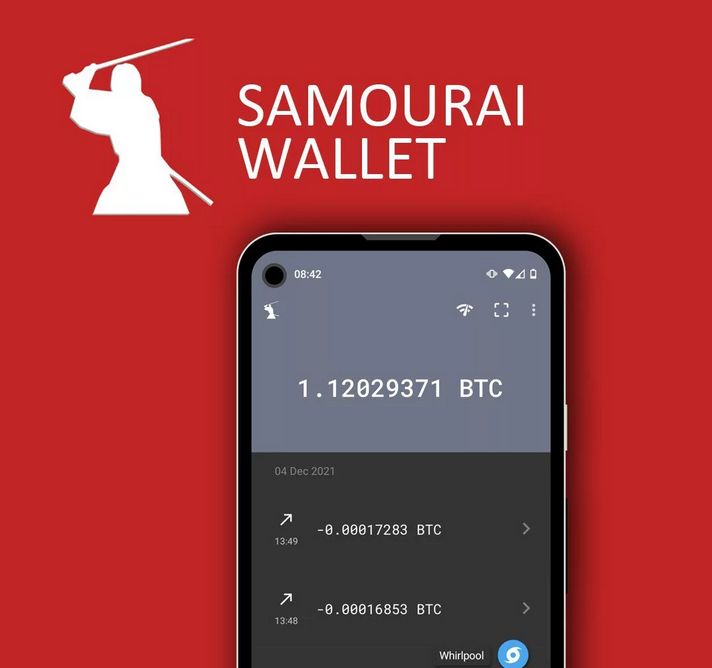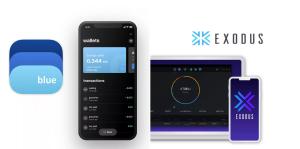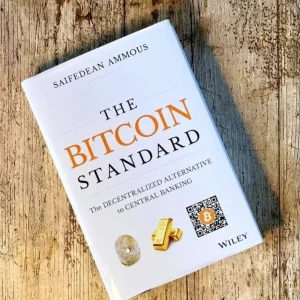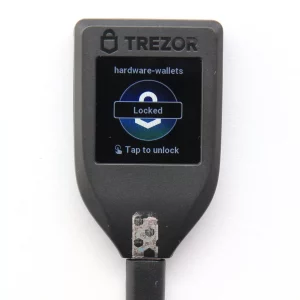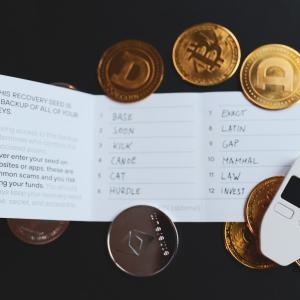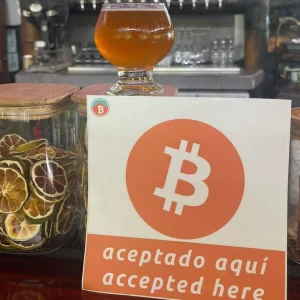Wasabi Wallet and Samourai Wallet are both noncustodial, open-source Bitcoin wallets designed with a focus on privacy and security. They share common features such as CoinJoin, which anonymizes transactions, Tor integration, which masks users’ IP addresses, Taproot, and SegWit. Furthermore, both are Bitcoin only wallets.
However, their target audiences differ slightly, with Samourai being a mobile wallet available exclusively for Android devices, while Wasabi is a desktop wallet compatible with Windows, macOS, Ubuntu, Debian, and Linux operating systems. In this review, we will look at the main differences between Wasabi and Samourai wallet.
Samourai Wallet: Mobile Wallet
On April 24, 2024, the founders of Samourai Wallet, Keonne Rodriguez and William Lonergan Hill, were charged with money laundering and operating an unlicensed money transmitting business. The Samourai apps have also been removed from the Google and Apple app stores.
Samourai Wallet stands out as an open-source, non-custodial Bitcoin wallet designed primarily for Android users. Its core focus revolves around safeguarding user privacy, ensuring transaction anonymity, and security. The wallet integrates Tor and VPN support, enabling users to conceal their IP addresses and shield their online activity.
The wallet’s setup process prioritizes security, prompting you to create a passphrase and PIN code, alongside generating a 12-word seed phrase for wallet recovery.
How to recover funds from Samourai wallet: If you have Bitcoin on Samourai wallet, you can recover your funds by migrating/exporting to an external wallet such as Sparrow wallet or Electrum. Here are detailed instructions on how to import your existing Samourain wallet into Sparrow wallet.
Wasabi Wallet: Desktop Wallet
As of April 27th, 2024, U.S. citizens and residents are restricted from downloading and using Wasabi Wallet and associated products and services, including APIs and RPC interfaces. This decision follows recent actions by U.S. authorities against the founders of Samourai wallet. Effective immediately, IP address blocking for U.S. residents is in effect on wasabiwallet.io, api.wasabiwallet.io, and zksnacks.com. Moreover, Wasabi is shutting down its CoinJoin coordination service for all users effective from June 1st, 2024.
In contrast, Wasabi Wallet is a privacy-centric desktop Bitcoin wallet renowned for its anonymity-enhancing features. The wallet integrates CoinJoin, PayJoin, and Tor functionalities to enhance transaction privacy and shield your identity. Its hardware wallet compatibility adds an extra layer of security.
Wasabi Wallet’s setup process is straightforward. It supports mnemonic seed phrase generation and password protection for wallet access. However, concerns linger regarding Wasabi’s compliance-driven CoinJoin implementation, potential vulnerabilities, and speculation regarding collaboration with blockchain analysis firms, raising doubts about its commitment to user privacy.
Ease of Use
Samourai Wallet excels in its mobile accessibility, allowing you to manage your Bitcoin on the go, which can be a significant advantage if you prioritize mobile convenience. However, it’s worth noting that to fully utilize its advanced features, such as coin control, Dojo, and privacy-enhancing tools like Stonewall and Ricochet, you may need to be more experienced or willing to learn, making it better suited for intermediate to advanced users.
On the other hand, Wasabi Wallet offers a desktop application, which some users may find more intuitive to navigate on a larger screen. Its CoinJoin feature, which enhances privacy by mixing transactions with others, is a notable aspect of Wasabi. However, some users might find the process of mixing coins and understanding the intricacies of CoinJoin a bit complex, especially for beginners.
Advanced Features
Wasabi Wallet focuses on user-friendliness without compromising on privacy features. It offers key features such as Tor, CoinJoin, and PayJoin. Features like Buy Anything facilitate direct buying of goods and services within the wallet, while Taproot and SegWit enhance transaction efficiency. Notably, Wasabi employs a Headless Daemon, a features that separates the user interface from the core wallet software. This enables you to interact with their wallet using a streamlined command-line interface without consuming ignificant computer resources.
Wasabi Wallet is shutting down its CoinJoin coordination service effective from June 1st, 2024.
Wasabi’s client-side block filtering feature eliminates the need to download the entire Bitcoin blockchain, which can exceed 500GB. Instead, it selectively downloads only the blocks that might contain transactions relevant to your wallet. While Wasabi suits beginners and those valuing privacy and usability, advanced users may find its options comparatively limited next to Samourai’s robust toolkit.
Samourai Wallet leads in advanced features compared to Wasabi, offering a comprehensive set tailored for privacy and security-conscious users. While features like CoinJoin, Taproot, SegWit, and Tor support are shared by both wallets, Samourai distinguishes itself with additional unique advancements, including the following:
- Whirlpool: Innovative CoinJoin implementation for obfuscating transaction histories and enhancing privacy. It advances the CoinJoin feature with a continuous mixing pool for bigger anonymity sets. It adds extra privacy methods like premixes and discourages address reuse.
- Dojo: Decentralized server for running your own full node to enable local CoinJoins away from centralized servers.
- Stonewall: Adds extra steps to transactions to prevent tracking and linking multiple transactions to the same user to protect you against unjust account closures.
- Stealth Mode: Conceals Samourai from the launcher and home screen and it can only be accessed via a secret code.
- Scrambled PIN: Randomized PIN access screen to thwart screen recording spyware.
- PayNym: Keeps Bitcoin addresses private between sender and recipient.
- Full Offline Mode: Supports offline wallet operations to bypass data network limitations and restrictions.
- Batch Spending: Combines unrelated transactions into a single transaction when miner fees are high and you have multiple transactions to make at a given time.
While Samourai Wallet boasts robust privacy features, it does come with its share of limitations. Unlike Wasabi, it does not support Coin Control and its complexity may prove daunting for beginners, particularly in tasks like running a full custom node using its Dojo feature, which demands technical expertise and resources beyond the reach of novice or casual users. Additionally, the absence of iOS support further restricts its accessibility.
Both wallets do not have multisignature functionality, and Lightning Network support, which can be a drawback if you are seeking advanced transaction capabilities.
Samourai CoinJoin vs Wasabi Coinjoin
When comparing mixing approaches, Samourai’s Whirlpool offers a continuous mixing pool where you can add unspent coins (UTXOs) at any time, resulting in a dynamic anonymity set that could potentially be larger and more private. In contrast, Wasabi CoinJoin operates with fixed-size rounds, requiring you to wait for a set number of participants before mixing, which may result in smaller anonymity sets, especially during periods of low traffic. This might make it easier to trace transactions compared to wallets with continuous mixing pools such as Samourai.
In terms of privacy enhancements, Whirlpool premixes and remixes transactions to provide extra obfuscation and discourages address reuse to strengthen unlinkability. Conversely, Wasabi CoinJoin may lack these additional features, potentially making transactions more traceable.
Regarding cost and control, Whirlpool charges flat coordinator fees based on the chosen pool size and offers users further control over mixing their “remixed” coins without additional fees. However, it requires a more technical understanding to use it effectively. On the other hand, Wasabi CoinJoin fees can vary depending on the service provider, with some wallets charging a percentage and others implementing flat fees. Overall, Wasabi CoinJoin offers a simpler user experience with lower initial barriers.
Since its release in April 2024, Wasabi Wallet’s coordinator has undergone an update, swapping out payments with low fees. This new feature effectively duplicates the spending of coinjoin inputs, fortifying defenses against Denial of Service attacks. To prevent unnecessary mining fees, Autocoinjoin now delays the start of the mixing process until funds are confirmed, ensuring that fees are only incurred for coins requiring privacy.
Some users have expressed concerns about Wasabi’s decision to censor certain transactions from CoinJoin in the past. This centralized control element might contradict the spirit of decentralization and privacy that Bitcoin aims for.
In conclusion, Whirlpool is more privacy-focused with continuous mixing, advanced features, and potentially stronger anonymity. However, it comes with a steeper learning curve and coordinator fees. Wasabi CoinJoin, on the other hand, provides a simpler user experience and lower initial costs, although it may have slightly less robust anonymity features compared to Whirlpool.
Fees
When it comes to fees, Samourai and Wasabi take different approaches. Samourai offers a flat fee for their Whirlpool coinjoin service, making it more cost-effective for users mixing larger amounts of Bitcoin. You also have more control over fees with Samourai, allowing you to adjust them after a transaction is sent. Wasabi, on the other hand, has a variable fee structure based on transaction size and network congestion. You can choose different fee levels to prioritize faster confirmations, but there’s also a 0.3% coordination fee for coinjoining transactions exceeding 0.01 BTC. To avoid unnecessary fees, Wasabi’s Autocoinjoin waits for confirmed funds before mixing. Remember that both wallets allow you to increase the fee for already sent transactions using Replace-by-fee method.
In short, Samourai is ideal for those who mix large amounts and want more control over fees, while Wasabi caters to users who value flexibility in transaction speed and might have smaller amounts to mix.
Samourai Wallet vs Wasabi Wallet: Summary
Here’s a quick summary of Wasabi vs Samourai:
| Feature | Samourai (wallet no longer available) | Wasabi |
|---|---|---|
| Bitcoin Only | Yes | Yes |
| Mobile App | Yes (Android) | No |
| Desktop App | No | Yes |
| Level | Intermediate | Intermediate |
| Lightning Network | No | No |
| Built-in Exchange | No | No (But you can buy good directly from your wallet via ShopinBit) |
| Source Code | Open Source Mobile Wallet | Open Source Desktop Wallet |
| Tor Support | Yes | Yes |
| CoinJoin | Yes | Yes, but shutting down its CoinJoin coordination service effective from June 1st, 2024. |
| Coin Control | No | Yes |
| Multisig | No | No |
| 2FA | No | No |
| SegWit | Yes | Yes |
| Taproot | Yes | Yes |
| Replace by fee (RBF) | Supports RBF | Supports RBF |
| PayNym | Yes | No |
| Watch-only | Yes | No |
| Batch Transactions | Yes | No |
| Message Signing | Yes | No |
| Run Bitcoin Full Node | Yes | Yes |
| Backup | 12-word seed | 12-word seed |
| Stealth Mode | Yes | No |
| Operating System (OS) | Android | Debian, Linux, macOS, Ubuntu, Windows |
| Hardware Wallet Integration | Yes | Yes (BitBox, Blockstream Jade, Coldcard, Ledger, Trezor) |
| Fees | Whirlpool (CoinJoin): Flat Fee, Coordination Fee: None | CoinJoin: Variable based on size and congestion, Coordination Fee: 0.3% for transactions > 0.01 BTC + mining fees |
| Wallet Type | Self-Custodial Wallet | Self-Custodial Wallet |
| Year Launched | 2015 | 2018 |
| Made in | United Kingdom | Gibraltar |
Samourai Wallet and Wasabi Wallet have a contentious history over Wasabi’s Coinjoin implementation privacy. Since 2019, Samourai has raised concerns about vulnerabilities, accusing Wasabi’s Coinjoin of being prone to Sybil attacks, compromising participant anonymity. In 2022, a dispute arose when Wasabi introduced a mechanism to reject some Coinjoin transactions, with Samourai decrying it as censorship. Samourai linked Wasabi’s mixing protocol to the PlusToken scheme’s deanonymization, alleging it facilitates coin tracking. They criticize Wasabi’s centralized coordinator for Coinjoin, citing potential privacy risks. Wasabi rebuffs these claims, asserting its security and ongoing improvements.
Choosing the Right Wallet: Wasabi or Samourai?
On April 24, 2024, the founders of Samourai Wallet, Keonne Rodriguez and William Lonergan Hill, were charged with operating an unlicensed money transmitting business. The Samourai apps have also been removed from the Google and Apple app stores. Moreover, as of April 27th, 2024, U.S. citizens and residents are restricted from downloading and using Wasabi Wallet and associated products and services. Effective immediately, IP address blocking for U.S. residents is in effect on wasabiwallet.io, api.wasabiwallet.io, and zksnacks.com.
Both Samourai and Wasabi are Bitcoin-only, open source wallets well known in the Bitcoin community for prioritizing user privacy and security.
If you are an Android user seeking an open source wallet with comprehensive privacy features, integration with hardware wallets, and anonymity-focused transactions, Samourai may be a good option for you. Its advanced privacy features, such as Tor support, Samourai Whirlpool, and stealth mode, are ideal for transaction anonymity and security. While Samourai enjoys popularity as a mobile wallet, it’s limited to the Android platform, lacking an iOS version.
On the other hand, if you want to handle Bitcoin transactions on your computer, Wasabi Wallet is a good desktop wallet choice valuing transaction anonymity, open-source transparency, and hardware wallet compatibility. Its innovative features, including CoinJoin, PayJoin, and Tor integration, boosts your privacy while its intuitive interface and hardware wallet support enhance your experience and security.
Wasabi Wallet is shutting down its CoinJoin coordination service effective from June 1st, 2024.
It’s essential to note that neither wallet supports the Lightning Network, multisig, or includes a built-in Bitcoin exchange. Samourai is solely accessible on Android devices, while Wasabi is designed exclusively for desktop use.
If you prioritize privacy and seek a wallet with a flat fee structure for mixing transactions, Samourai Wallet may be the better option. Its Whirlpool feature charges a consistent fee regardless of transaction volume, providing cost-effective privacy solutions. However, if you value flexibility and want control over transaction fees based on size and network congestion, Wasabi Wallet could be the preferred choice. Finally, as hot wallets, both are inherently more vulnerable to hackers compared to hardware wallets that remain offline.
However, it’s important to be aware that while CoinJoin enhances privacy, Wasabi’s specific implementation of the technique might have vulnerabilities that could allow advanced tracing techniques to deanonymize transactions. The decision by Wasabi to censor certain CoinJoin inputs raises concerns. This could limit its effectiveness for users seeking maximum anonymity. There are also speculations about Wasabi collaborating with blockchain analysis companies. This could compromise user privacy if true.

